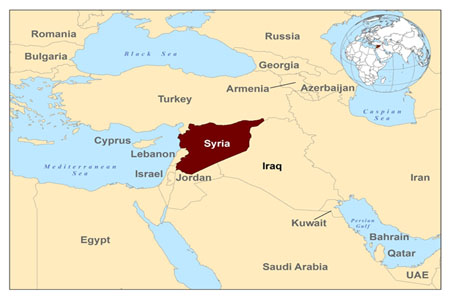
Afrasianet - The United Arab Emirates reopened its embassy in Syria's capital on Thursday for the first time in seven years, the latest sign of efforts to end Syria regime head Bashar al-Assad's isolation as one of the century's most deadly wars winds down.
On Thursday afternoon, UAE's charge d'affaires Abdul-Hakim Naimi visited the embassy and witnessed his country's flag being raised again on the compound in central Damascus.
"The opening of our embassy is a first step for the return of other Arab embassies," the UAE's Naimi told reporters outside the compound.
The UAE recalled its ambassador from Syria in 2011 after the start of the popular uprising against Assad. The Syrian Embassy in the UAE remained open.
"An Arab role in Syria has become even more necessary to face the regional expansionism of Iran and Turkey," UAE Foreign Minister Anwar Gargash said on Twitter.
The move provides a major boost to Assad, whose forces have won a series of military victories in recent years with the help of Russia and Iran.
According to independent monitors, hundreds of thousands of civilians have been killed in the war, mostly by the regime and its powerful allies, and millions have been displaced both inside and outside of Syria.
The brutal tactics pursued mainly by the regime, which have included the use of chemical weapons, sieges, mass executions and torture against civilians have led to war crimes investigations.
Sudan's President Omar Bashir visited Damascus earlier this month, becoming the first Arab head of state to visit Syria since the start of the war.
Earlier on Thursday, Tunisian media reports said Syria and Tunisia - the birthplace of the Arab Spring - had resumed direct flights for the first time in seven years.
A Syrian passenger flight reportedly arrived in Tunisia's Monastir Habib Bourguiba International Airport. The jet was operated by Cham Wings Airlines.
Normalising Assad
In October, Assad told a little-known Kuwaiti newspaper that Syria had reached a "major understanding" with Arab states after years of hostility.
He did not name the Arab countries in the interview, which was his first with a Gulf paper since the war erupted, but said Arab and Western delegations had begun visiting Syria to prepare for the reopening of diplomatic and other missions.
The interview came on the heels of a surprisingly warm meeting between the Syrian foreign minister and his Bahraini counterpart on the sidelines of the UN General Assembly in September. The meeting turned heads because it featured hugs between the two ministers.
The encounter raised questions about whether the Gulf countries, most of them sworn enemies of Assad ally Iran, are reconsidering their relations with Syria.
Gulf nations are reportedly moving to readmit Syria into the Arab League in 2019, eight years after it was expelled from the 22-member body following Assad's bloody response to the peaceful demonstrations.
Arab countries had sanctioned Damascus and condemned its deadly use of military force against protesters.
The majority of the Arab League's members, barring three or four states, want Syria to be readmitted, an Arab diplomat told Reuters last week.
On Wednesday, diplomatic sources told The Guardian that there was growing consensus among members of the Arab League that Syria should be readmitted.
The next summit of the Arab League is due in Tunis in March.
The Syrian conflict began when the Baath regime, in power since 1963 and led by President Bashar al-Assad, responded with military force to peaceful protests demanding democratic reforms during the Arab Spring wave of uprisings, triggering an armed rebellion fuelled by mass defections from the Syrian army.
Around 560,000 Syrians have been killed in the country's war, with the Syrian refugee crisis one of the largest displacements of people in modern times.
More than half of all Syrians have been displaced by war, including nearly six million who have fled the country.
The war has caused cataclysmic destruction to Syria's civilian infrastructure, with regime military offences to recapture urban centres turning cites into dust.
December 27, 2018

